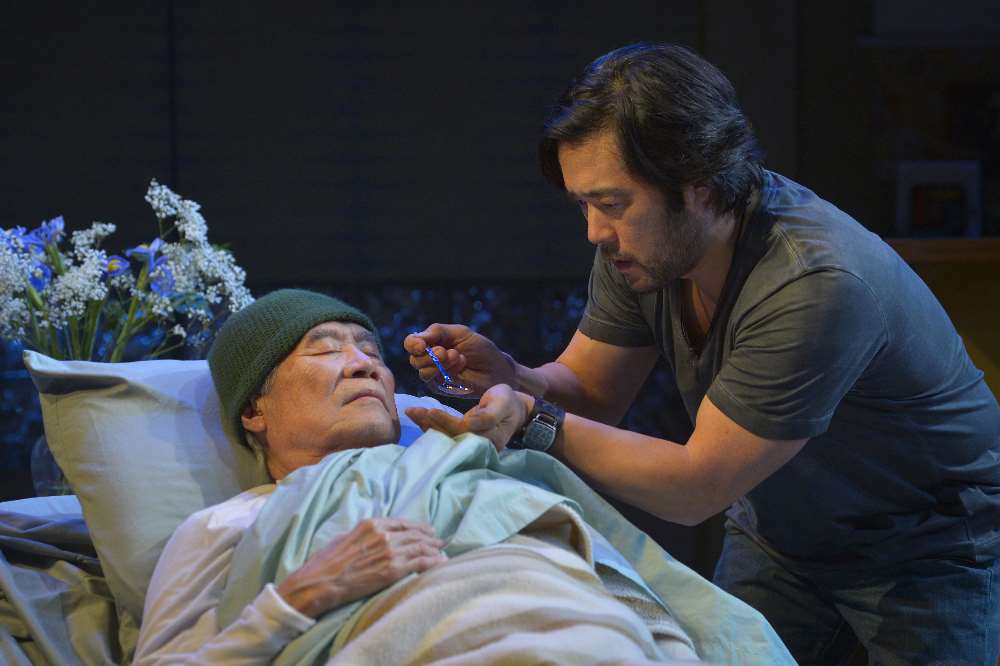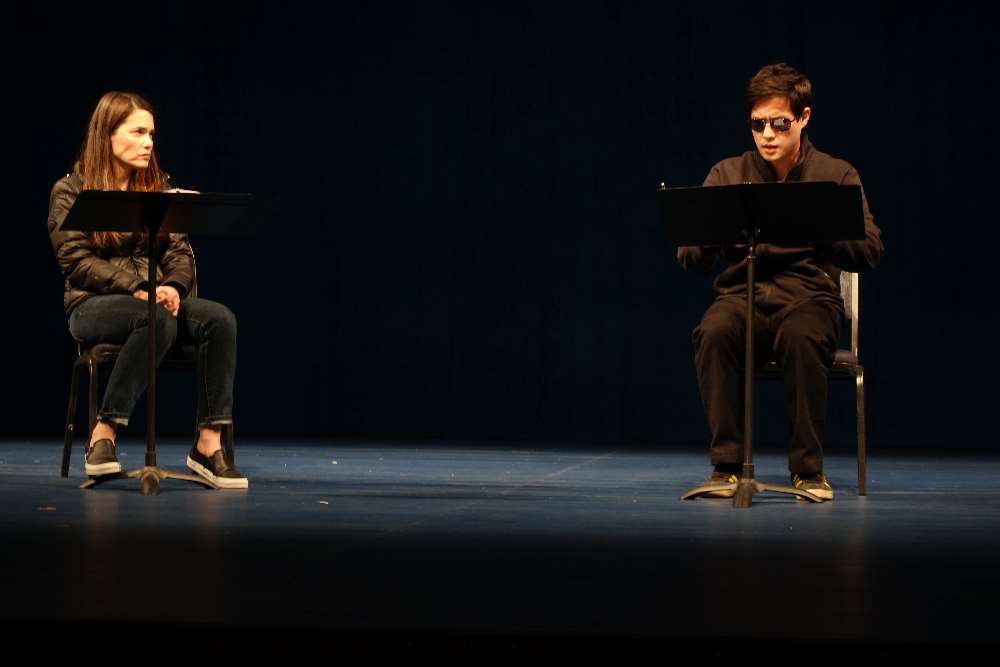BERKELEY and COSTA MESA, CALIF.: In 2009, after the premiere of her play The Language Archive, Julia Cho was stricken by that thing that most writers dread: writer’s block. “I was deeply afraid that maybe I would never write another play again,” the playwright said. Up until that point, Cho was prolific. She had had a new play premiere every year since 2002, including 99 Histories and Durango, with 12 works in total. And then in 2009, the river ran dry.
“Even at the time I was writing Language Archive, I felt like: Man, I’m really tapped out! I felt like I barely managed to write it,” she recalled. Now, six years later, it seems that the river has begun flowing—or the dam has been broken, another one of the water metaphors Cho used during our conversation. She has two world premieres in the space of the next two months: Aubergine at Berkeley Repertory Theatre (through March 20) and Office Hour at South Coast Repertory (April 10–30). Then starting Aug. 19, Aubergine will play at Playwrights Horizons in New York City.* As another aquatic adage goes, when it rains, it pours.
“I didn’t think it through very well,” she admitted with a laugh. “I really should’ve grouped it out.” But you can’t question when inspiration strikes—or rather, when life events will lead to inspiration. For Cho, her playwriting hiatus coincided with the death of two close people in her life: her father in 2010, and a close friend, poet Kim-An Lieberman, in 2013. “I felt like my well was dry to begin with,” she said. “Then when my dad passed away, there wasn’t a bucket even, and I [couldn’t] even find the well anymore!”
Then about three years ago, Madeleine Oldham, director of Berkeley Rep’s Ground Floor new-play incubator program, approached Cho and 16 other writers to create short plays about food. Faced with such a low-pressure situation, with no guaranteed production, Cho decided it was time to rejoin the playwriting world. And because Cho is Korean, she decided to tackle a subject she knew well: Korean cuisine. As she wrote, the play morphed into a meditation on grief; it follows a Korean-American man, a chef, who is facing the imminent death of his ailing father.
“I think had I sat down to write a play about grief and loss, there would be no way…That doesn’t sound fun at all,” she said. “But by sitting down and thinking about food, it was this weird trick. I had tricked myself and didn’t even know it! And it was probably the only thing that allowed me to write.”
That 20-page draft expanded, over the course of a year, into Aubergine, which is another name for eggplant. As a character in the play notes, in poetic, Cho-esque fashion: “Aubergine is so much more beautiful. ‘Eggplant.’ That sounds like an awkward, milky white, sickly thing.”
In the play, the son is charged with cooking his father’s favorite meal, mu guk, a Korean radish soup. This task both addresses the pain of loss but gives tribute to food, and how culturally specific dishes can extend across generations and language. “You can lose an entire language so easily, but I most likely will eat what my grandmother ate, with as much and equal relish as she did,” said Cho, who can’t speak Korean, though the play contains some Korean dialogue. “And my children will eat what my grandparents ate.”
Aubergine is not directly autobiographical, but Cho incorporated her own experience of caring for a dying parent, including her familiarity with Ensure or how to choose a mattress for an immobile body. “I really tried to tell the truth about what it is like when somebody dies, because I felt like I came to it with such ignorance,” she explained. “As it was happening, when my father was in hospice, it was such a revelation to me that this is just the way people die. I wanted, in some weird way, to be able to invite people—in hopefully a non-threatening way—to just see what it’s like. Because we’re all going to die; we’re also all going to see a loved one die.”
This universal truth is what drew Berkelep Rep artistic director Tony Taccone to the script. He’s directing the production, Cho’s first at the theatre.
“[Aubergine’s] unique in that it unrelentingly resists melodrama,” he said. “It really is trying to describe a very truthful experience about caretaking somebody who’s dying. I’ve had that experience in a pretty deep way, more than once. For me personally, the play is about the grace that’s possible inside of grief.”

Right after Cho finished Aubergine, she immediately started work on Office Hour, a speedy transition to a new project that she said has never happened to her. Cho was initially fascinated by the 2007 Virginia Tech shooting but wasn’t sure whether she wanted to approach the subject like a documentarian or create a fictional narrative.
Her approach for Office Hour is a complete 180 from the straightforward, heartwarming Aubergine. Structurally, Office Hour resembles Caryl Churchill’s short play Hearts Desire, which replays the same scene but in different variations. (For musical theatre fans, a similar reference point is If/Then). Office Hour tackles the issue of gun violence, focusing on a fictional event in which an Asian-American teacher, played by Sandra Oh, has an encounter with an Asian-American student who may or may not be a shooter. The same conversation is presented in a variety of different ways, leading to different outcomes.
“I read some books about Virginia Tech, and there’s so much in what I was reading about how much [shooter] Seung-Hui Cho frightened his teachers, how clear it was to the people around him that there was something very wrong with him,” Cho said. It hit home for her, as she had been a teaching assistant in college. Having to act as an ad-hoc therapist for troubled students can be, she recalled, “a scary place to be, because you have so much responsibility, but you have zero training in any of that.”
Even though Office Hour tackles an inherently dramatic topic, as with Aubergine, Cho strove to treat it in a manner that doesn’t sensationalize the events. Instead, according to the show’s director Neel Keller, who serves as associate artistic director at Center Theatre Group, the play is an exploration of the issues surrounding gun violence—what causes it and how to address it.
“It’s about the guns, and it’s also about mental health and terrorism and income inequality and racism,” he said. “I think the issues that underlie an individual’s decisions to do something like this are unbelievably complex, and I feel like that’s the [reason for the] complexity of Julia’s play and the complexity of its structures.”
Office Hour marks Cho’s sixth production at South Coast Rep; Keller and Cho have known each other for almost 15 years. He has read many of her plays, including Aubergine. He thinks these two new works mark a new chapter for the playwright.
“She feels like a more experienced writer now, in that she can let the stories and the characters lead her,” he said. “She doesn’t have to force them and constrain them into the plot of the story that she has conceived first. In both of the plays, there seems to be a real presence of life and the fickleness of life, in good ways and bad—the flow and uncontrollably of life.”

Going with the flow is also a mantra now for Cho. Though she isn’t working on any other plays presently (she’s waiting for Office Hour to open), she has no doubt she’ll continue to write plays. A writing hiatus isn’t so scary anymore.
“What that long period of time of not writing plays taught me is it’s actually okay to not write a play for a little while, and you can cross that when you’re ready,” Cho said. “One thing I did find in my time of not writing is actually doing nothing is helpful! So I think my goal will be to create that space for the next thing to come.”
*This news arrived after the story was posted. We’ve added it in.


